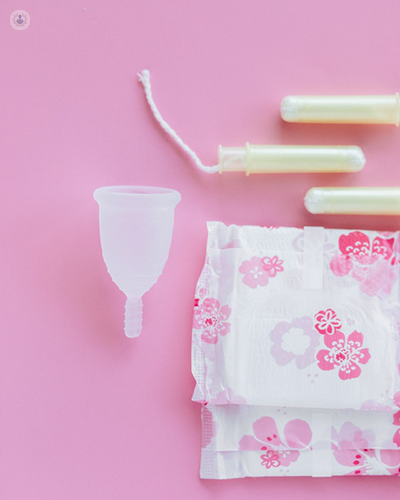When should you see a doctor about spotting between periods?
Escrito por:The onset of spotting, bleeding between periods, can be a cause of concern for women as the cause behind it is often unclear to the patient. In this article, leading consultant obstetrician and gynaecologist Ms Pushpakala Maharajan offers expert insight on the most common causes behind spotting, as well as explaining how the cause a patient’s of spotting is identified.

Is spotting between periods common?
Bleeding between periods is not considered a normal part of the menstrual cycle. An average period for women is from twenty-one to thirty-five days. The bleeding happens usually after three weeks of no bleeding and can last from a few days to a week. Any bleeding that is outside of this remit is considered abnormal and it is important that this is discussed further with a health professional because there could be underlying causes behind this bleeding.
What does spotting look like?
Intermenstrual spotting (between periods) could range from pinkish discharge to anything like a light period and for some is even heavier than a light period. Usually, spotting only lasts for a day or two and nothing more. Still, it is something that warrants investigation and should be looked in to.
What are the causes behind spotting?
There could be many causes behind spotting. Commonly, hormonal imbalances lead to spotting. Also, pregnancy related issues like early miscarriage or early pregnancy problems can be the cause behind spotting. Benign conditions like polyps, fibroids, infections such as PID (pelvic inflammatory disease) or being on the pill itself can lead to spotting.
Conditions like ectropion, a condition where cells like those from inside the cervix grow outside, can also be the cause of spotting. Other systemic conditions like weight loss or stress in life could also lead to spotting. Remotely and very rarely, cancers can cause spotting as well. This could be from the lining of the womb, the vagina or other areas.
Is spotting during pregnancy always a cause for concern?
The causes of spotting could be variable depending on the gestation of pregnancy. Let’s focus on the bleeding that happens in the first trimester which is up to twelve weeks. This could be implantation bleeding where the pregnancy has started with an implantation. The implantation on the lining of the womb can cause this bleeding.
Otherwise, in early pregnancy loss, miscarriage or missed miscarriage and ectopic pregnancy can all lead to spotting. Also in cases where the pregnancy is viable, cases of cervicitis or infection can cause spotting to occur.
Is spotting a cause for concern for women generally?
Any bleeding outside normal periods and a normal pattern should be evaluated. You need to see your doctor to make sure that you’re referred properly.
Normally, we take a detailed history which includes your previous cycles, the length of your cycles and where the bleeding happens. We also look into if you have a previous history of PID, as well as your smear history and other medical conditions you have or medications that you take that could have an impact, such as thyroid function.
We also undertake examinations. We do a smear test and take swabs, do a speculum examination and examine the abdomen to check there are no lumps or bumps. We also make sure your cervix looks normal. Additionally, we take swabs and perform an ultrasound to check the lining of the womb to see if you may be suffering from a condition like fibroids, adenomyosis, endometriosis, ovarian cysts or polyps, amongst others, that could cause bleeding in between periods.
Further on, if there are any irregularities in the ultrasound, we normally continue treatment by taking a biopsy from the lining of the womb or also doing a hysteroscopy (a camera procedure looking inside the womb) to rule out any abnormalities.
If you are concerned about abnormal menstrual bleeding, you can book a consultation with Ms Maharajan by visiting her Top Doctors profile.


